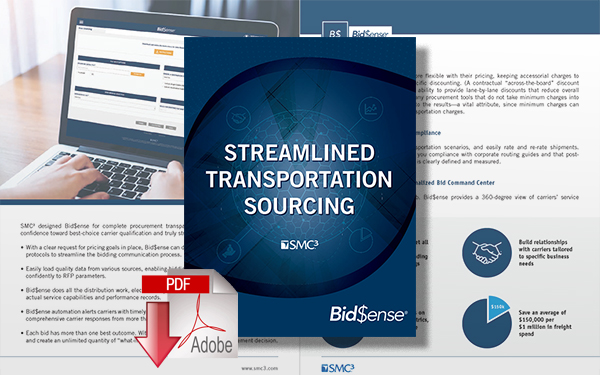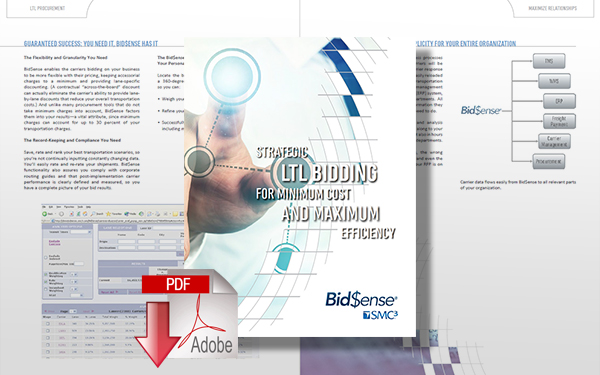Educational Workshop: Removing Complexity from the Modern Less-than-Truckload Bid Process

Even though many less-than-truckload processes have become easier over the years, the bid process is one that’s become more complex, it can be an overall complicated process, and even with the best planning, there are several ways things can go awry.
RFP Process for LTL Shippers & Carriers
The changes over the last few years, including the COVID-19 pandemic, have added new layers of complexity to the RFP process for LTL shippers and carriers.
The SMC³ Educational Workshop on Removing Complexity from the LTL Bid Process recently tackled some of these layers directly with help from logistics experts around the industry.
What’s Changed About the Bid Process?
The number of RFPs shippers make, as well as the kinds of bids they receive, is driving much of the change. “The frequency has definitely ramped up,” Stacey Feldman, client success partner II at SMC³, said. “Contracts used to be 12 to 24 months, and they’re written with shorter time frames now. Nobody wants to get locked into something.”
“Shippers are being more aggressive about expanding their carrier base and expanding their capacity in the marketplace,” added SMC³’s director of business development Justin Springer. “So, what that’s led to is more frequent bids – and maybe the onus on the bid process not being so much on the pricing side, but on service and capacity.”
The realities of transportation today have accelerated shippers’ timelines and changed their priorities – and as bid volume and frequency go up, carriers are responding with flexibility and a greater focus on capacity. Springer elaborated that “shippers understand that a bid may not result in savings like they had hoped for in the past when they would do an RFP every two or three years.” That shift means there’s now more room for different types of bids (like LTL micro-bids), added flexibility – and, as Matt Goebel, senior manager of procurement at XPO Logistics mentioned, collaboration in putting together RFPs.
Read: Three Bidding Strategies to Maximize Performance in a Tight Freight Capacity Market
“A lot of our shipper customers are experiencing the same kind of challenges,” Goebel said. “What we’ve seen is them reaching out to us to say, ‘Hey, look, we need help.’ We need you to be a partner and tell us what we’re doing wrong and how we can improve.”
How to Thrive Amid Modern RFP Challenges
Lay the Groundwork
“First, define your goals,” Springer said. “There’s a lot of different reasons that shippers may go out to bid. Traditionally, people think of that as more of a price play, but we’re in a very different market today.” Is timeline the priority? Capacity? Handling? Does it still come down to price? How do service-related issues with the previous carrier affect what the shipper needs this time? The more that’s known before starting the process, the smoother it goes.
Use new communication channels appropriately
“We’re creatures of communication,” Goebel said. “The challenge is, through COVID-19, making sure that we don’t lose the human element.” The pandemic has limited some of our ability to leverage the human element in LTL bidding, but that just means staying in touch is that much more important.
The challenge is that the relatively new remote working era has created the assumption that the person you’re trying to work with is ‘always available.’ After all, they’re just a calendar invite away, right? But e-meeting fatigue has been shown to have negative effects on productivity and mood, both of which are vital to a successful, mutually beneficial LTL bidding experience.
“Try to avoid that ‘death by meeting,’” Springer said. “You can sense a palpable frustration if you’re on a call where that person has been on back-to-back calls.” Do your research before joining a call so you can help guide the conversation and cover more ground. Have a clear agenda so you know when your objectives are being met. As Springer says: “Don’t waste their time.”
Make Your Data Work for You
“Data drives results,” Goebel said – and shippers are working with more data than ever before. With operational data like dock doors, shipping and receiving hours, and more, cleaning and organizing it all can be the difference between winning or losing an RFP, especially in today’s market. “The better the data that we can get on the front end, the more accurate representation we get from our carriers from a pricing standpoint.”
“You can have as much data as you want,” Springer added. “It’s a question of is it good and how do you leverage it?”
Bid$ense from SMC³ helps shippers optimize RFP data to mitigate price increases, evaluate carriers by performance metrics, eliminate carriers with custom criteria, track savings and lanes, and save money by streamlining the RFP process. On the other end, carriers get the level of detail they need to have the right conversations, set the right prices, minimize risk, and bid with confidence. From bid creation to discount tracking, SMC³ Bid$ense provides a place for shippers and carriers to work together to optimize RFPs.
“For me, it goes back to understanding customer expectations and needs throughout the process,” Goebel said. While it feels like transportation and logistics are typically slow to transition, but across the LTL industry, things are moving faster than ever. To keep up, shippers and carriers need to have frank, productive interactions – starting with reliable data and healthy communication.
Schedule a short Bid$ense demo or read more about the benefits of automating the RFP process here.
As part of this cutting-edge hybrid learning curriculum, students will have an opportunity to hear weekly from industry experts and work through a self-paced curriculum of emerging industry topics. You can learn more about this course and other courses on the schedule.
Related Papers
Bid$ense: Streamlined Transportation Sourcing
This paper details how using Bid$ense leverages SMC³’s lifetime of transportation purchasing knowledge, allowing customers to incorporate pricing, claims ratios, on-time performance, and transit times into their LTL bidding analysis. Download Now!
Strategic LTL Bidding for Minimum Cost & Maximum Efficiency
This paper details how SMC³ designed Bid$ense for complete procurement transparency, and how you’ll move ahead with ease and confidence toward best-choice carrier qualification and truly strategic LTL procurement. Download Now!
More SMC³ Resources
Related Article: SMC3 Releases Exclusive Hybrid Online LTL Curriculum
Article Topics
SMC3 News & Resources
Mastering LTL Shipping: Strategies to Become the Carrier’s Top Choice Career Success in LTL: Insights from Industry Veterans Effective Strategies for Last Mile Returns in LTL Logistics SMC3 Mercury Gate Case Study - Improving Workflows and Enhancing Efficiency with LTL APIs SMC3: Is Technology a Competitive Advantage in the Modern Supply Chain Industry? Armada’s Prather examines the disconnect between the freight economy and the macro economy at SMC3 JumpStart 2024 SMC³’s Solution to the Logistics Industries Talent Problem More SMC3Latest in Transportation
Trucking Industry Pushes Back on Government’s Electric Mandates Maersk Sees Silver Lining in Red Sea Shipping Challenges Baltimore Opens 45-Foot Deep Channel Following Bridge Collapse El Paso Border Delays Cost Juarez $32 Million Per Day in Economic Losses Ranking the World’s 10 Biggest Supply Chains The Top 10 Risks Facing Supply Chain Professionals Walmart’s Latest Service: Ultra Late-Night Delivery More Transportation

















